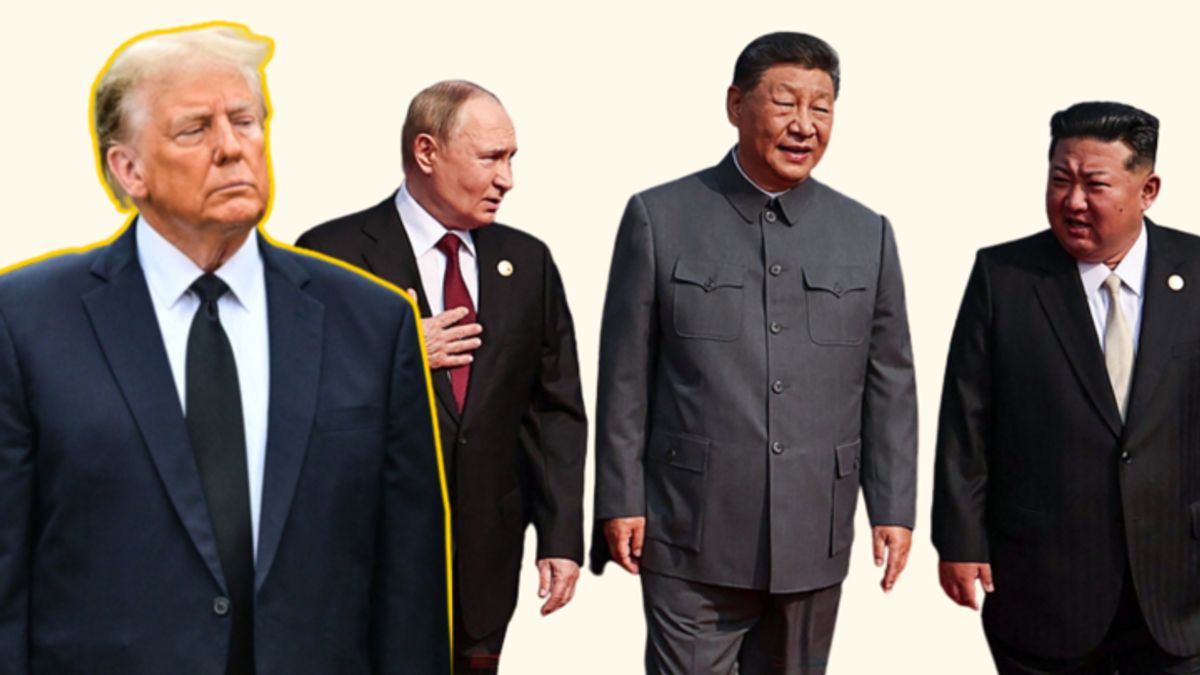In September 2025, U.S. President Donald Trump posted that Russia's President Vladimir Putin, North Korean leader Kim Jong Un and Chinese President Xi Jinping were conspiring against the U.S.
Why it matters
- The allegations highlight ongoing tensions between the United States and these three nations.
- Such statements can influence public perception and international relations.
- The comments reflect the broader geopolitical landscape and the challenges faced by U.S. foreign policy.
In a striking social media post in September 2025, former President Donald Trump made serious accusations against prominent world leaders, claiming they were collaborating in a conspiracy against the United States. This assertion has reignited discussions around the complex relationships the U.S. maintains with Russia, North Korea, and China.
Trump specifically mentioned Russian President Vladimir Putin, North Korean leader Kim Jong Un, and Chinese President Xi Jinping as being involved in this alleged plot. The post, which quickly gained traction among his supporters and critics alike, emphasized Trump’s ongoing concern about foreign influence and interference in American affairs.
The former president's remarks come at a time when U.S. relations with these countries are already fraught with tension. With Russia's ongoing military actions in Ukraine, North Korea's continued missile tests, and China's assertive stance in the Indo-Pacific region, Trump's comments resonate with concerns among many Americans regarding national security and international stability.
Political analysts believe that Trump's rhetoric serves multiple purposes. For one, it reinforces his stance as a tough leader who is vigilant against perceived threats from abroad. Moreover, by framing these leaders as conspirators, he taps into a narrative that portrays the United States as being under siege, which can galvanize his base and influence public opinion.
Critics, however, argue that such statements can be detrimental to diplomatic efforts and exacerbate existing hostilities. The potential for misinterpretation and escalation in tensions is a significant risk, especially given the volatile nature of international relations today. For instance, comments that are perceived as aggressive can provoke retaliatory actions or further entrench adversarial positions, making diplomacy more challenging.
In the wake of Trump's post, responses from the leaders in question were notably absent, which may indicate a strategic choice to avoid escalating the situation further through public exchanges. Instead, they may prefer to address their concerns privately or through diplomatic channels, as any public rebuttal could fuel the narrative Trump has put forward.
The international community is closely monitoring this situation, especially as it could have broader implications for global politics. Trump's claims could influence how U.S. allies perceive their relationship with these leaders and impact military and economic partnerships.
Moreover, the timing of Trump's assertion coincides with significant political developments in the United States, where he has been actively campaigning for a return to the presidency in the upcoming elections. By framing foreign leaders as antagonists, Trump not only seeks to solidify his image as a strong leader but also aims to rally support from voters who prioritize national security.
Experts warn that such rhetoric can have long-lasting effects on U.S. foreign policy, particularly as it relates to military engagements and economic sanctions. The potential for a shift in U.S. strategy toward more confrontational approaches could alter the landscape of international diplomacy significantly.
As the situation unfolds, it remains to be seen how other political figures and international leaders will respond to Trump's accusations. Will they seek to clarify their positions? Or will they allow the narrative to play out as is? One thing is certain: the repercussions of this social media post will likely be felt across the globe, affecting not just U.S. relations with these countries but also the perception of American leadership on the world stage.
In summary, Trump's allegations of a conspiracy involving Putin, Kim, and Xi underscore the intricate and often fraught nature of global politics. As the narrative continues to develop, the implications for diplomacy, national security, and international relations will be critical to observe.











